The topic of this week end is about five tools to renew our life.
- Prana: To renew our life we have to change our Prana level. So, we need to know how to increase prana, how to conserve prana and how to check your prana.
- positive thinking: To renew our life, we need to resolve all the negative emotions within us and we have to sort it all out and keep positive thinking.
- adaptability: to renew our life, to refresh our life, we have to be ready to be flexible, to adapt to new conditions, and to work with our ego. We need to understand where we are now, at this moment, and we can change accordingly so we stay in the present and not be pulled down by the subconscious mind, by the past.
- Meditation in daily life: learn to have another awareness about your daily life activities.
- Detachment: In order for you to renew yourself, you need to be detached, because if you’re not detached, then you are bound. Bound means you are not free. You are pulled down by your attachment. The teaching today is about how to be detached.

THE NATURE OF THE TRUE SELF:
To understand what detachment means, you need to know about the nature of the Self first, your true nature. Your true nature is sat chit ananda. Sat means all the time there, it is not coming and going. It’s not true that when you are born, you start to exist, and when you die, you are finished. In fact, your spiritual nature or your spirit is always there, your consciousness or your true self is always there. To understand this, we need to develop a spiritual approach to life. It means that you need to live your life with a bigger perspective, with a bigger idea of what life is, you need to know the purpose of life, and who you are. Then in this context, we can talk about detachment. If you do not know who you are, then we can’t talk about detachment because for you, everything in life is just action, everything is just attachment, everything is about involvement, everything is drama. You are in what we call the Battle of life, you lost your own true Self in the Battle of life. Sometimes you win, sometimes you lost. Something good happens and you are happy, and sometimes you have a difficult situation, then it is a big drama. For example, in a pandemic situation you must close the business, stop everything, and things are disturbed, and you are disturbed.
So, we talk about detachment only if you know what you need to be detached from and what you need not to be attached to.
These are two words Swami Sivananda said before he left his body. These are two very important words. He said: “Detach, attach”. It means detach about everything else and attach to God. Detach about everything that you think that is true, real and important and attach to the knowledge of God, of Truth, of the Self. That’s all that is.
The Self is Sat Chit Ananda — three words.
WHAT MEANS SAT?
Sat means it’s always there. It doesn’t come, it doesn’t go, it was not born and it will never die. If you are attached, then everything comes, everything is born, comes about and everything dies. But if you are detached, then you understand that it’s only an appearance. It’s what you feel right now that’s what it is, but it’s not. There’s another level that is not like this and you need to discover that level, that something that is not coming and going and changing and is impermanent. Buddhism talks about the truth of impermanence and of everything that is changing. In order for you to know that which is not changing, you have to be detached. That is Sat. The Self is truth, absolute, eternal.
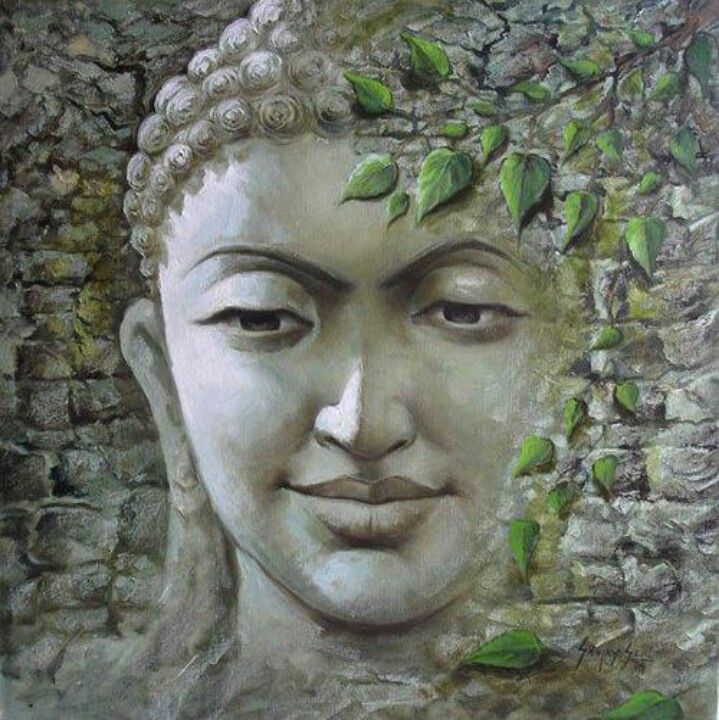
WHAT MEANS CHIT?
Chit means consciousness or knowledge, absolute. It means it is only a temporary condition that you are veiled that you don’t know and you are ignorant.
But the true condition is you are consciousness. How do I know? I know because I am that itself. If I think that I am this, then I don’t know that. But if I think that I am you, my true self is you then I know you. So that is difficult to understand. But you see, inside of us always is a desire for knowledge.
We want to know. Some people just finished studying and then they don’t know what to do with their life. So they study another branch. And then they study another two, all the time they study. But they study, many people study, study, study. And they still feel that they don’t know. Because they study things externally, but they don’t have the knowledge of the Self. So yoga, Vedanta have different methods for you to know the self. You have to control the mind, control the emotions, you have to make your life sattvic, calm and pure, you have to meditate, be quiet, be silent and don’t worry, don’t have negative emotions, meditate, don’t be disturbed by anything then the clarity will come to you about everything because there is only one Self, one truth, one consciousness.
WHAT MEANS ANANDA?
Ananda is something that you relate to more. Maybe Knowledge, Consciousness you don’t know but happiness you know. You know your desire for happiness. All the time you are seeking for bliss or for happiness or for fulfillment — and Ananda. Actually, when you are seeking for happiness, basically you are seeking for the Self. You are seeking for happiness in somebody or in something because the Self is happy by nature and it projects that happiness on something external. You project that happiness on something outside and you seek for it, you want to be one with it. The true nature of the Self is happiness absolute. It means it doesn’t need anything to be happy. It is in itself happiness, unconditional happiness. The true nature of everything is happiness. Your mind gets attached to different conditions and attributes happiness or unhappiness to different things. But, if you look within, then your true nature is Ananda or Bliss.
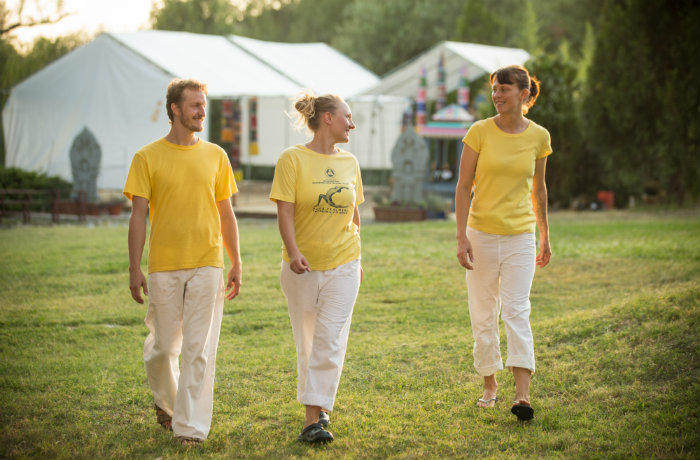
DETACHMENT FROM THE MIND ACTIVITY helps you to access Satchitananda.
First, you need to know the true nature of the Self — Sat Chit Ananda.
Second, you need to know that your mind is not really reflecting that happiness or that true nature. The nature of the mind is conditioned, it is looking outside, it depends on the senses, it is imperfect, it is full of desires, it is swinging between what you like and what you don’t like. It has egoistic ambition, it thinks all the time about something that is unreal, it’s always building up a story. So let’s say you think that you want to become the richest person in the world, the first person that will go and live on the Moon, the first person that will go and live on Mars. So there is a race like this: who will be the first person that will live on the Moon or Mars, or the richest person. So you have a different idea that is egoistic. It is based on your idea to compete with somebody or to be the best. These are called ego ideas. The mind is full of this. When we say the word ‘mind’ it includes your emotions, your ego, your desires. So I say in general ‘the mind’. It comes, it goes, it has a nature of veiling the truth.
And if you attach yourself to it then you don’t have peace. Maybe it gives you the motivation to become the best in the world, the richest person or the fastest person, or the most powerful person, it gives you the motivation to do things, to work hard, but you are looking for that outside of the Self. Really what you’re looking for is the peace Sat Chit Ananda, your true Self, but you’re looking outside of yourself. What you need is looking through your mind, disregarding what is being projected by the mind and clearing out the mind.
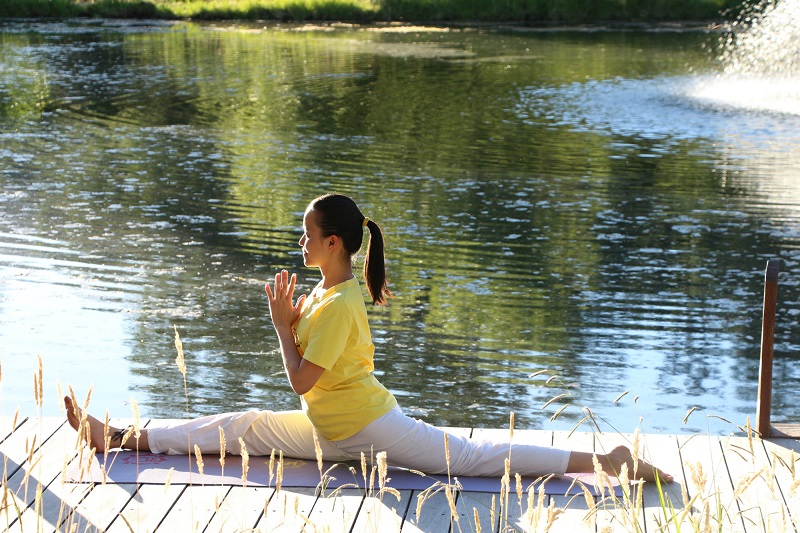
THE ANSWER LIES WITHIN: we have what we are looking for
The teaching says you need to look at the right place. The answer lies within. What you are looking for you have, that’s the teaching of Vedanta. Really, you already have it and you waste a lot of energy looking for it.
So you need to calm down, relax, detach, then you’ll find.
STORY: a lady losing a needle, she goes outside the house looking for her needle. People say: where did you lose your needle?
She said “I lost it inside the house”.
“So why do you go outside?”
“Because outside there is light”
You are looking in the wrong place, like this lady.
Looking inside means trying to realize your own Self. Looking outside means constantly running externally and believing that the sensual world that we live in is true. Believing that the world is created by our senses, our mind, the internet is true, therefore, we have no time to look within.
In fact, what you are seeking for, you already have. Let’s assume, the lady would look for her needle inside the house, even though it’s very dark. Let’s assume she would look for it with the tip of her finger, because she can’t see when there is no light. But she will find it. So if you continue yoga, meditation you would feel better, even though it seems pointless, that there is no result.
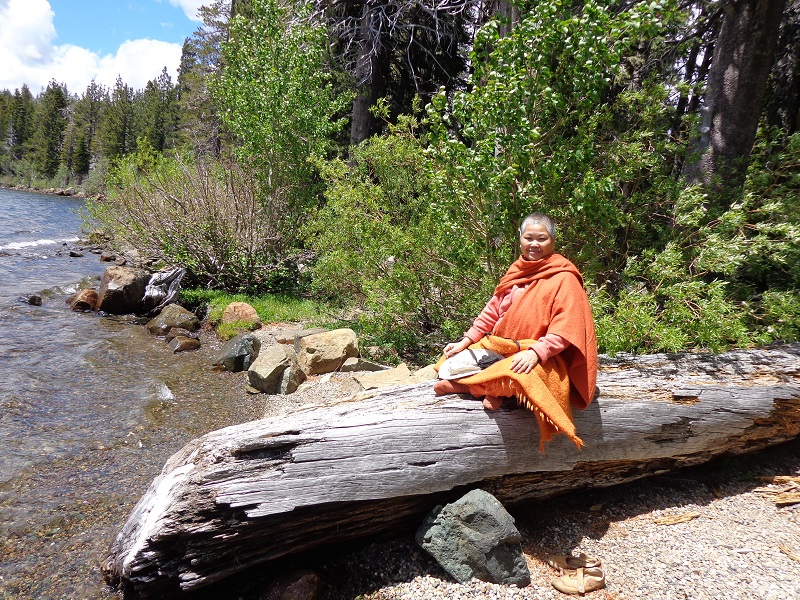
ANOTHER STORY:
The deer is running looking for the smell called the musk that comes from his sweat. The sweat of the animal has that smell. And the deer is running looking for that smell coming from his own body, yet, he looks for it somewhere else. Sometimes, I wear my glasses and I was looking, where’s my glass? Where’s my glass? But it’s on me.
So we have what we are looking for. And we have to wake up from that running and looking for it somewhere else.
DETACH- ATTACH : IT IS NOT EASY TO BE DETACHED:
There’s a story about a lion, a tiger walking in the forest. I like this story. And he walked in the forest and the leaves of the trees fell down. The leaves still had this sap sticky thing. So when we walked in the forest on the leaves, the leaves stuck to his feet. He wanted to remove the leaves and sat down. When he sat down, the leaves stuck to his butt. So he wanted to remove the leaves on his butt and lied down to remove the leaves on his butt. When he lied down, the leaves are attached to his back. So he rolled around. And soon he had leaves all over his body.
What the story says, sometimes we want to be detached from something. Let’s say you want to be detached from your boyfriend. Yeah, because you get attached to the boyfriend and then you become obsessed and the boyfriend is liking somebody else and then you suffer. Or it can be about the girlfriend and you want to be detached from her. People suffer a lot out of this attachment, out of this kind of drama in their mind. And they want to forget. For them detachment means to forget. So what do they do, they drink alcohol to be detached from a boyfriend or girlfriend, from emotional drama and then what happened they will be attached to alcohol or to sleeping pills. Then when they want to detach from sleeping pills or alcohol, they will attach themselves to cigarettes. And when they want to detach from cigarettes, then they would attach to food, they want to detach from food then they would attach themselves to work. So constantly we keep attaching ourselves to different things and it doesn’t solve our problem.
All what everyone wants is to be free. You say I’m going to work so that I can be free and I have enough money to do what I like. And then the work gets attached to you and you get attached to the work.
You can go on and give different kinds of examples. It’s not that easy to be free. One attachment leads to another, then another leads to another, you are just piling them up and you feel like you are in prison. Sometimes you feel like you are a slave to everything. You turn around and the family wants you to do something. You turn around and the boss wants you to do something. You look at yourself and your insights: Oh, I need a promotion and I need a different job so I can be happy. And then you go outside and then the newspaper says you know you need to buy this thing then you’ll be happy. And then you go talk to your friend and your friend says this is a new fashion you know you need to do this, do this and that and then your whole life you’re trying to find happiness and freedom and you feel like you’re sinking like the tiger in the example above. He tried to free himself and he has his body completely with the leaves.
Attachment brings suffering
Sometimes it can be very dramatic. People suicides, they attack their own life because they feel that they cannot get out of the situation. And some people fall sick because it’s a form of slow dying when you’re sick or when you are depressed. Depression is also self destruction because you feel bound, you feel heavy. The drama of your life is occupying your mind and you have no clue that you are in fact — Sat Chit Ananda. It seems this statement is completely up in the air, not real, not feasible, not accessible.
I described here the condition of our attachment. Feel free to give me more examples. But you can look around. Look in the news. Look in the story of people. There is a lot of suffering, attachment brings suffering. If you attach to your beauty, because now you’re young and beautiful, what will happen? When people praise you: Oh, you’re so pretty, you’re so beautiful, your hair is so beautiful, then what happens? When you attach to your skin and your hair, and then your beauty and if something happened to that beauty, then you feel very miserable. And if you get old, you feel very miserable. Because you lose that name, that aura. If you are attached to being intelligent, then you meet people more intelligent than you. And you meet a situation that you feel very stupid because you don’t understand anything.
If you are attached to being strong. I always give that example. It’s a very good example. It is an example of superman. Christopher Reeves is the actor of Superman has been chosen to be Superman. I mean, he has a strong, gorgeous, powerful body. And then Superman makes a lot of money. Yeah, he’s a famous actor on top of the world. And one day by karma, he fell off his horse, he broke his spine or something, he became paralyzed, he had to sit in the wheelchair. So he lost the Superman aura, he is no longer Superman, he lost his job, lost everything. So if he is attached to his image of Superman, attached to his body, he would not be able to accept this condition to sit on the wheelchair.
Actually in an interview, he said that in the beginning, he wanted to commit suicide. He was very lucky because he had a very good wife and children who accepted him and took care of him. And he turned around and detached from his name and fame and image and body and found his spirit that is not affected by the body condition. He found his perfect spirit inside and then he worked for this organization to take care of the rights and privileges of handicapped people. Through this huge accident he was forced to detach from the external and found himself inside.
There are 4 ways of detachment:
- Karma Yoga detachment: Karma Yoga taught that wherever you live and whatever you do, try to be detached from results. Be detached from results means to be detached from the idea that you are doing something and you want something out of life.
Whatever you do, either you are a mother, or when you have a job or whatever you do in life, do the best, do your duty, and let go of the result. Be detached from the result. – it can be any kind of job, a high paying job or just a servant job, People praise you fine, people criticize you fine, you do a good job, fine, you don’t do a good job, fine, you’re fired from the job, you have to find another job, or you don’t have any job, fine. Be detached from that.
What does detachment mean in this context? It means don’t identify yourself with what you do. Identify yourself with the immortal Self that is already here.
That’s Karma Yoga’s teaching about detachment. This practice of detachment in daily life saves you a lot of headaches. Bhagavad Gita says your right is to work only. But not with the result. You have to work, try to do the best you can, and try to contribute. But it’s not about you. So be detached from what you do.
- Bhakti Yoga detachment:
The second way how you practice detachment is detachment in Bhakti yoga. In fact, Bhakti yoga detachment means the yoga of devotion. You need to be detached from your emotions. So you transform your emotions into the highest, purest kind of love, called devotion. Let’s say you are with somebody you don’t like and you’re attached to your emotions. I don’t like this person. I like that person more. And this person makes me angry. This person makes me happier. Your mind is always looking for the person that makes you happy and runs away from the person that makes you angry. This is how the emotions work. The emotions swing all the time: either you run towards something out of projection or pleasure, either you run away from something out of fear or out of pain. Emotions bring attachment, attachment to the past pleasure. You’re attached to the past when you ate the ice cream, you felt so happy. So you’re attached to the ice cream. Somebody said nice words to you so you felt very sweet, you felt very important for that person. So then you get attached to them.
Attachment is an emotion, and we are 95% emotional. We are very emotional by nature, that’s why we are full of attachments by nature. We are attached all the time. Bhakti yoga taught us to turn this attachment into something helpful by getting attached to God, but detached from anything else.
Bhakti Yoga helped an emotional person with lots of emotions and an attached tendency to be attached to God instead or to the highest goal, to the highest ideal.
Bhakti yoga people has difficulty to detach because they are emotional, so they have a lot of attachments. The only thing they need to do is to switch it into attachment to God, to the right thing while being detached from everything else. In fact, the Bhakti Yogi will not practice detachment, he/she just practice attachment, but attachment to the right thing.
it is important for you to know that attachment comes from your emotions. So if you are identifying with your emotions and then you have that attachment to the emotion that will bring about pain. The only thing you need to do is to attach the same emotion but towards God, towards something that is your ideal.
The reason of this switch is because when you attach to an external object, be it a person, or an object, then you lose yourself. However, when you attach the emotion to God, you regain yourself, because God is including you. But if you get attached to somebody else external to yourself, you lose yourself.
Raja Yoga detachment:
The third way of practicing detachment is Raja Yoga kind of detachment. Raja Yoga says detach from thoughts. Raja Yoga is a method of meditation. You sit quietly, you withdraw the senses and you meditate and you concentrate. At that time, your attachment is your concentration on a pure ideal, via the mental repetition of a sacred mantra. During meditation, if thoughts come in your mind, you become detached, you observe the thought and you let it go, you don’t get involved with the thoughts.
This is the main method of detachment of a meditator: you are detached from your own thoughts, you become the observer of your thoughts and you keep yourself concentrated. Here, there is attachment in the form of concentration on a mantra. Technically, your mind can think of only of one thing at a time so if you are attached to a mantra, you are detached from everything else. The sacred mantra induced sacred vibration and has the capacity to merge the meditator with the divine presence which is the essence of the mantra. This will happen when the concentration on it becomes one pointed.
Raja Yoga theory explains that if you concentrate on a mantra, then you’ll be detached from other thoughts, you will not be involved in other thoughts, because Raja Yoga says if your mind is completely one pointedly focused then it becomes meditative. It dissolves all the talks in the mind and then you become one with what is. If you allow a lot of thoughts and distractions in the mind then it takes all your energy it leads you here and there, and you get lost. When you have a lot of thoughts in the mind you are lost. So, when you think too much and you have a lot of thoughts you need to reduce the thoughts by keeping only a few thoughts that are important and detach from the rest.
Focus, reducing distraction, renouncing anything not important and try to follow through with the thoughts you retain. Keeps the mind very concentrated on one thought, detached from distractions, not worrying about anything else. This is Raja Yoga detachment. This is the Raja Yoga meditator’s way of detachment.
It takes detachment to be able to concentrate. When a person is not concentrated, when they are very distracted, whatever comes their way, they say: “Yeah, I like that” and they start to do it. And when somebody else says something else: “Yeah, it’s interesting. I like that too”. So they start to do everything and then get themselves involved in everything, spending a lot of money running around trying this and trying that and then not being able to stay still and not finding happiness. Consequently, practice detachment from all thoughts and repeat your mantra which is that pure idea, that neutral thought that is high in vibration, given to you by your teacher. You can repeat the mantra and let go of everything else.
Jnana Yoga detachment:
The fourth type of detachment practice is called Jnana yoga detachment. For Jnana yoga detachment you need to have discrimination. What does it mean? You need to know what is Truth and what is not Truth, what is Self and what is not Self, what is important and what is not important, what is essential and what is non essential. So, then you detach from the unreal, from the non essential and you get attached to that thing that is real, that is essential.
Jnana Yoga is not teaching you to get attached. It says to you that you need to know the difference between real and unreal. And you need to be detached from the unreal. And when you are detached from the unreal and then real will be there. That’s it. You don’t have to be attached. In Bhakti Yoga — yes. In Jnana Yoga — no.
What kind of detachment depends on your personality, however, Sivananda taught the synthesis of Yoga, a combination of the 4 types of Yoga.
You can say depending on your temperament, depending on your strengths and weaknesses, it would be easier for you to detach from this or that. Maybe it’s easy for you to detach from distractions, because you are a very focused personality, but it can be very difficult for you to be detached from emotions that is part of your being as a very emotional person. Then at that time, you need to apply also Bhakti Yoga, that means you need to attach to God so you have to work slowly on your detachment and your attachment.
I remember what Swami Vishnudevandaji said one time, almost 40 years go, when I just started my Yoga path, that “you will not be born, nobody will be born if they don’t have any form of attachment.”
So attachment is the reason why you’re born. Detachment is the way out of the cycle of birth and death, of the called “cycle of samsara” or cycle of suffering.
The Buddha practiced his discrimination, he used his buddhi, his intelligence, he knew what is real and what is not real, what is permanent, what is impermanent, what is true and what is false and what is illusion. And what is the projection of his mind and what is his true essential nature and he meditates. He detached from everything else and he attained enlightenment. That means he becomes free, free from suffering. He has understood the true purpose of life.
In the same manner, we try to detach from our illusions, detach from things that are impermanent. You always have had experience of the impermanence, you get the desired object, and you know that it will be gone. You know that your mind has always been doing this, it fantasizes and it gets disillusioned. You need to wake up from this. The mind is always grasping things, and thinks it’s real. And then you get it and then the charm disappears, and the mind changes. And you’ll felt let down: “Oh, I thought it was so ideal. It was so good.!”
Kick it, before it kicks you. Future suffering should be avoided.
I want to share with you this sentence I came up with a long time ago: “kick it before it kicks you”, which means detach from it before it leaves you.
So if you know something is impermanent and is changing, don’t be attached to it. Because it will leave you, it will change and then you’ll suffer, it’s painful. It’s better that you take the decision to leave it because you understand the true nature of it is illusory. It promises you something yet you know, it’s just a matter of time that you will suffer from these illusions. Do you want to suffer?
If you don’t want to suffer then do something about it. If you enjoy suffering, and you say “okay, I can have a little bit of pleasure, a little bit of happiness, and if it leaves me, fine and good, I accept the price to pay. It will be painful, but it’s okay. It doesn’t matter.”
I give now some worldly example. Let’s say that’s you get romantically involved with somebody that is already married. While you are happy to have the company of the person, you know that at the end it will not work out. There’ll be big pain, separation, pain for you and for other people. So then stop it. I’m sorry, I would say: ” detach from it, detach from that temptation of pleasure”. This example is a kind of a big drama, but you know the story of painful forced detachment can be applied to everything else in life.
Jnana yoga meditation can be practiced only when you have an inner conviction, an inside knowing of what is good and what is not good, what is real and what is illusory, what is the truth and what is not. At that time, you detach from everything else that is not real, and what remains is the truth. If your true nature is peace and happiness and your mind is always projecting peace and happiness somewhere else then when you detach from everything else, and what remains is happiness. You get that? I should repeat. If your true nature is happiness already, but you don’t see it and you project the idea of happiness on something or somebody else, then if you detach from that something or somebody else, then what remains is happiness. Make sense?
“Sounds great!”. Diana, the student says : ” it sounds great!”
Yeah, you just have to detach, because you already have happiness. But you have the illusion that happiness is somewhere else. So be detached from the illusion and what remains is happiness. By not seeking happiness you will be happy. By chasing after happiness, you will be suffering. By being content and knowing yourself, then automatically you will be happy.
So, if you don’t kick things and things will kick you. If you do not detach, it will leave you and you will suffer. This happens also as a lesson, as a way to make you learn. Yes, you learn in suffering, in losing, in separation, in heartaches, and you’re forced to be detached.
So I learned another sentence from Swami Sivananda. He says: ”love little but love long”. It’s so nice. Because your tendency is you love something or somebody and you think if you love more, the more you love, the more you will have more love then you’ll be happy, you will have more happiness. Rajasic emotional nature thinks like this. This lovely thought “ love little but love long” means be detached from this illusion of passion, the illusion of emotions. In practice, If you feel that you love this too much, you get attached to this too much, then diminish it, love little and then it will last.
Summary and Conclusion:
Jnana yoga detachment is difficult because you have to be already discriminative and know what is real and what is not real. Raja Yoga detachment towards thoughts is easier. You can keep concentrating on the mantra, and then let go of all thoughts that come to mind and Meditate. In Bhakti Yoga meditation, just attach yourself to God, it is kind of easy but you can become fanatic.
And the last is Karma Yoga meditation, Karma Yoga detachment is working on the sense of non-doer-ship. Don’t get attached to your actions. Don’t get attached to your accomplishment. Do your duty and let go of the results.
Best is you practice all the paths, as they lead to the same place. But start one thing at a time, start with something the most concrete for you, be it Hatha Yoga when you have to detach from pain, from postures that you like and postures you do not like. You also at times, have to detach from routine even though you learn the discipline of a routine practice.
Hare Om tat sat.
OM shanti
Swami sitaramananda

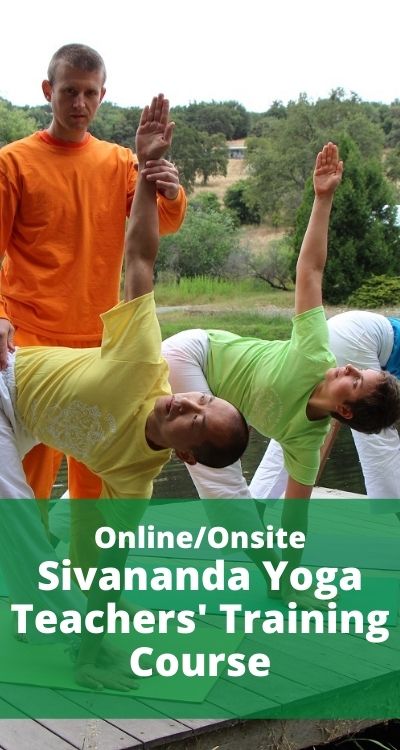


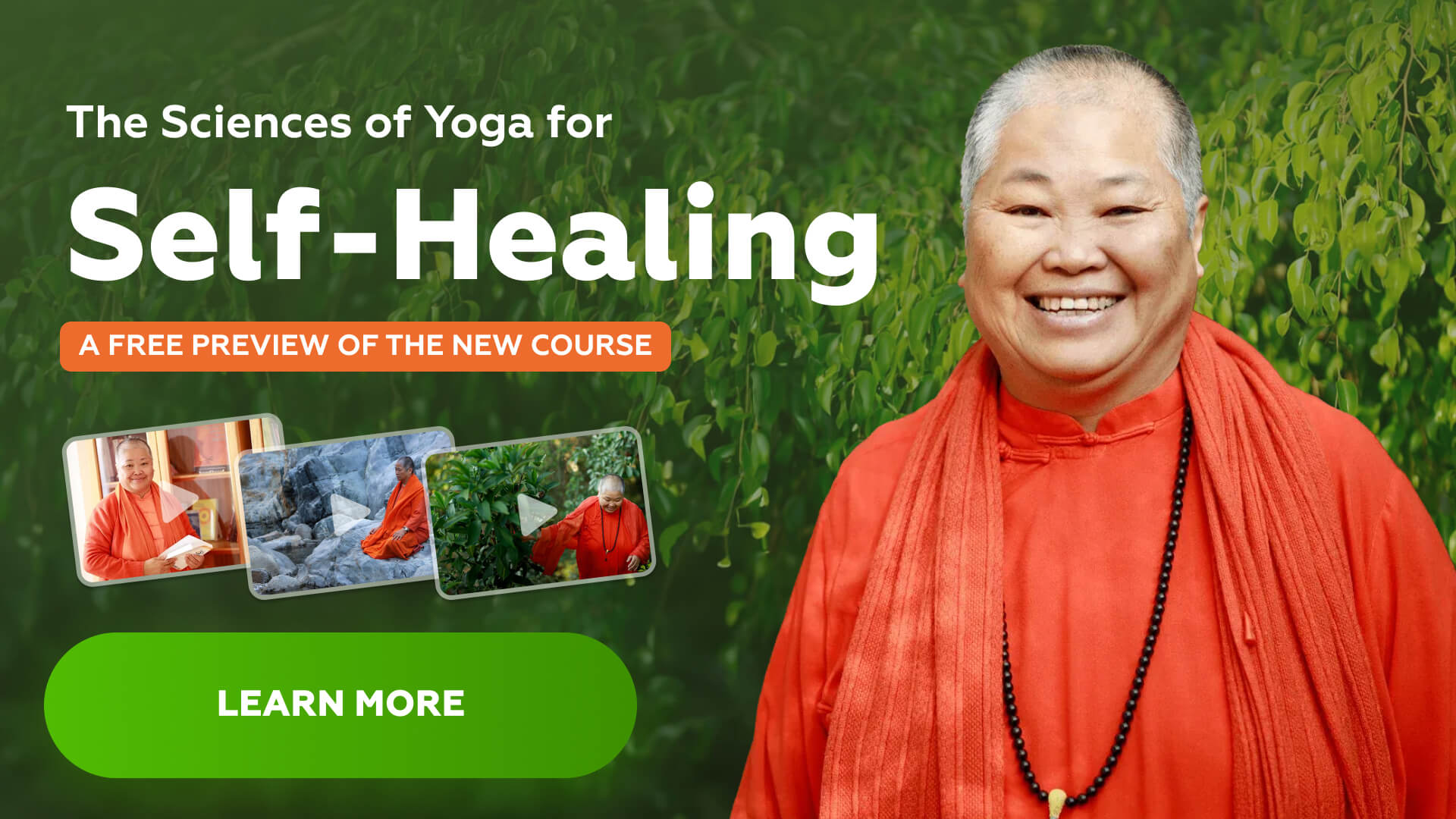
Thank you ! I have never been a very Intelligent person. So I read the above info a few times to really try to understand the meaning of these words. Let go , let God ! This is how I summed this all up in short. Detach-Attatch . Blessings 🙏
Surrender to suffering that’s all.